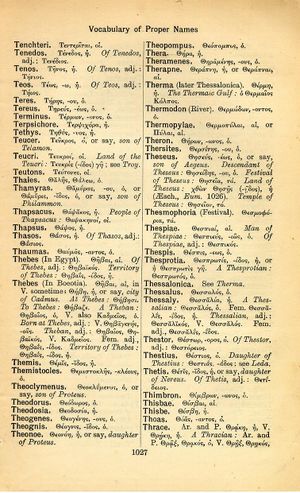Tereus
τὸ γὰρ μυστήριον ἤδη ἐνεργεῖται τῆς ἀνομίας· μόνον ὁ κατέχων ἄρτι ἕως ἐκ μέσου γένηται. (2Thess 2:7) → For the mystery of lawlessness is already at work — just at work until the one who is now constraining it is taken out.
English > Greek (Woodhouse)
Τηρεύς, -έως, ὁ.
Latin > English (Lewis & Short)
Tēreus: ĕi or ĕos, m., = Τηρεύς.
I A king of Thrace, husband of Procne, the sister of Philomela, whom he violated, Hyg. Fab. 45; Ov. F. 2, 629; id. M. 6, 497, 6. 615; 6, 635; Mart. 14, 75, 1.—Hence, Tērĕĭdes, ae, m., the offspring of Tereus, i. e. his son Itys, Ov. Ib. 436.—
II The name of a tragedy by Attius, Cic. Att. 16, 2, 3; 16, 5, 1.
Latin > French (Gaffiot 2016)
Tēreūs,¹³ ĕī ou ĕos, m. (Τηρεύς), Térée [roi de Thrace, fut changé en huppe] : Ov. F. 2, 629 ; M. 6, 497 || titre d’une tragédie d’Attius : Cic. Att. 16, 2, 3 ; 16, 5, 1.
Latin > German (Georges)
Tēreus, eī u. eos, Akk. ea, m. (Τηρεύς), König in Thrazien, Gemahl der Prokne, der Schwester der Philomela, Vater des Itys, schändete die Philomela und wurde zur Strafe in einen Wiedehopf verwandelt (s. Philomēlau. Procne), Hyg. fab. 45. Ov. fast. 2, 629: Genet. -ei, Verg. ecl. 6, 78: Genet. -eos, Stat. silv. 3, 3, 176. Mart. 4, 19, 4; 14, 75, 1: Akk. -ea, Verg. Aen. 11, 675. Ov. met. 6, 615 u. 647. Stat. Theb. 12, 480: Vok. -eu, Ov. met. 6, 497: Abl. -eo, ibid. 635. – Dav. Tērëidēs, ae, m. (Τηρΐδης), der Terëide, Sohn des Tereus, d.i. Itys, Ov. Ib. 432.

